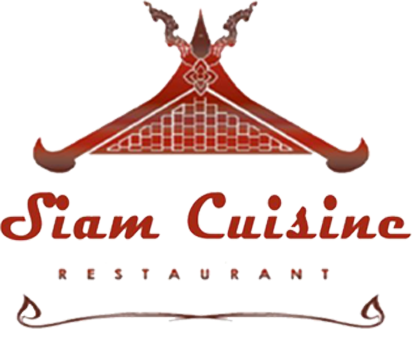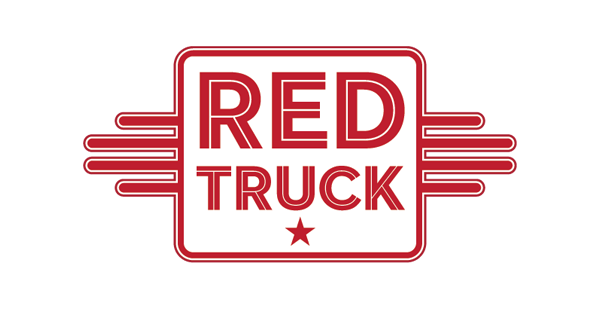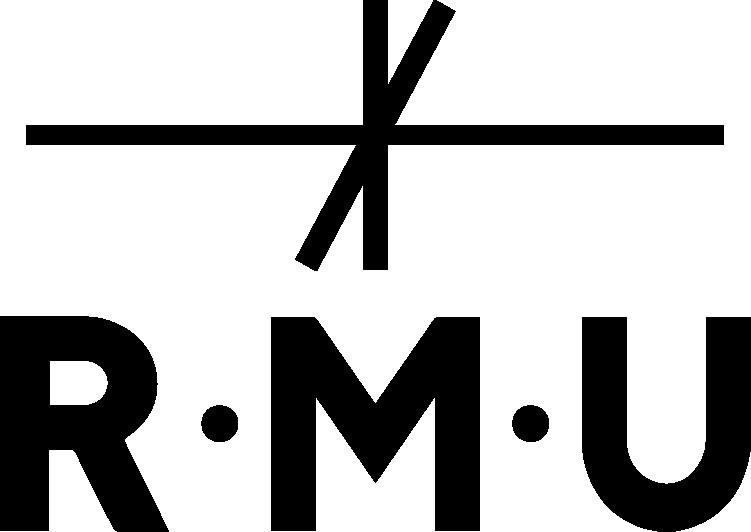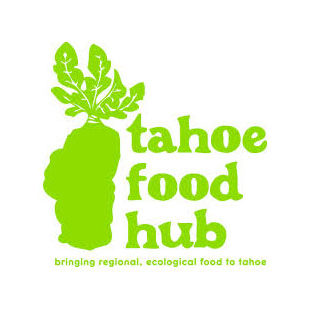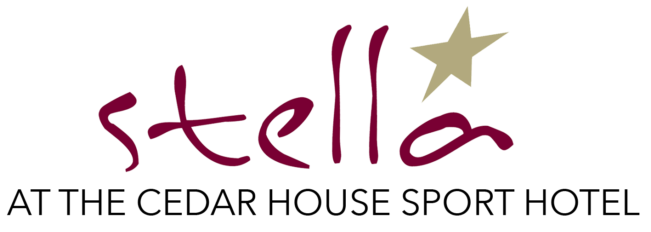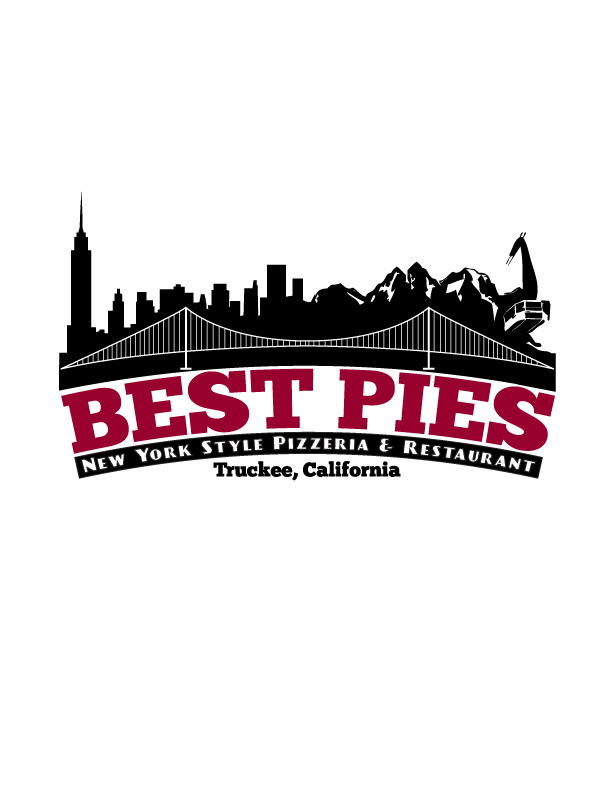Single-Use Foodware Reduction
About
Single-Use Foodware Reduction in Truckee
The Town of Truckee is committed to reducing waste and supporting a shift towards reusable foodware through a combination of local policies and programs. By shifting daily habits, whether it’s choosing a reusable cup, skipping unnecessary utensils, or offering dine-in meals with durable dishware, both individuals and businesses play a crucial role in preventing waste before it starts. Creating systems that make reusable options accessible helps foster a culture of sustainability across our community.
In Truckee, this is supported through Town ordinances which reduce single-use waste by encouraging reusable options in everyday food service, while complementary initiatives help make sustainable choices more convenient and accessible. Residents can borrow free reusable dishware for events through the Borrow Greenware program, use durable containers for takeout meals via the Green Box Program, or participate in the OKAPI Reusables system to borrow and return coffee cups using a mobile app. To support businesses in this transition, the Town also offers grants to make implementation of new ordinances easier. Click through the tabs above to find out more about these programs!
Together, these efforts reduce waste at the source and make it easier for everyone in Truckee to contribute to a more sustainable future.
What’s the deal with single-use foodware in Truckee?
Single-use items like plastic utensils, coffee cups and straws are part of our everyday lives. After intense environmental inputs to produce these items, they are used once and end up in our landfills, environment, streams, lakes, and oceans forever, since plastic does not biodegrade. Single-use foodware packaging makes up 68% of litter found in Truckee. Community members, student groups, and our town council members have asked for policies to reduce these disposable items in Truckee.
Can’t we just recycle or compost foodware items?
Recycling and composting are not reliable outlets for single-use items. Due to recent regulations in China, the ability to recycle materials has significantly been reduced. In Truckee, we can only recycle clean #1 and #2 plastics, paper, metal, and glass. Be sure to rinse out recyclable foodware items before tossing them in the blue bin to be sure food residue doesn’t prevent it from being recycled.
Compostable products made from corn, sugarcane or other plant-based materials are not necessarily sustainable alternatives. In reality, these types of “compostable” bioplastics or fibers, are not accepted at most composting facilities, including our own, and instead go to landfill. In fact, “compostable” plastic items are a common contaminant in Truckee’s food scraps bins, and just one piece of contamination can cause the entire bin of food scraps to be sent to landfill instead of the compost facility. Plus, these products still require resources to produce, including land, water, and fossil fuels, and are still only used once before being thrown away.
What is the solution to single-use foodware?
The most impactful strategy is to reduce the amount of waste generated in the first place. The goals of these ordinances are to:
- Reduce the use of ALL disposable foodware, regardless of if it’s plastic, compostable, or paper. There is no “best” single-use option, and we are focusing on reducing the use of ALL disposables.
- Create a cultural shift towards reusable foodware. Reusable foodware beats single-use alternatives by every environmental measure. In just 15 washes, reusable containers beat out disposables for environmental impacts.

Often we only consider if a product is composted, recycled, or landfilled. However, the impacts from production (material extraction, manufacturing, and transportation) are actually responsible for a majority of the environmental impact. Reusables are only produced once, reducing environmental impacts over time.
Remember the waste management hierarchy: REDUCE, REUSE, RECYCLE AS THE LAST RESORT!
Ordinance
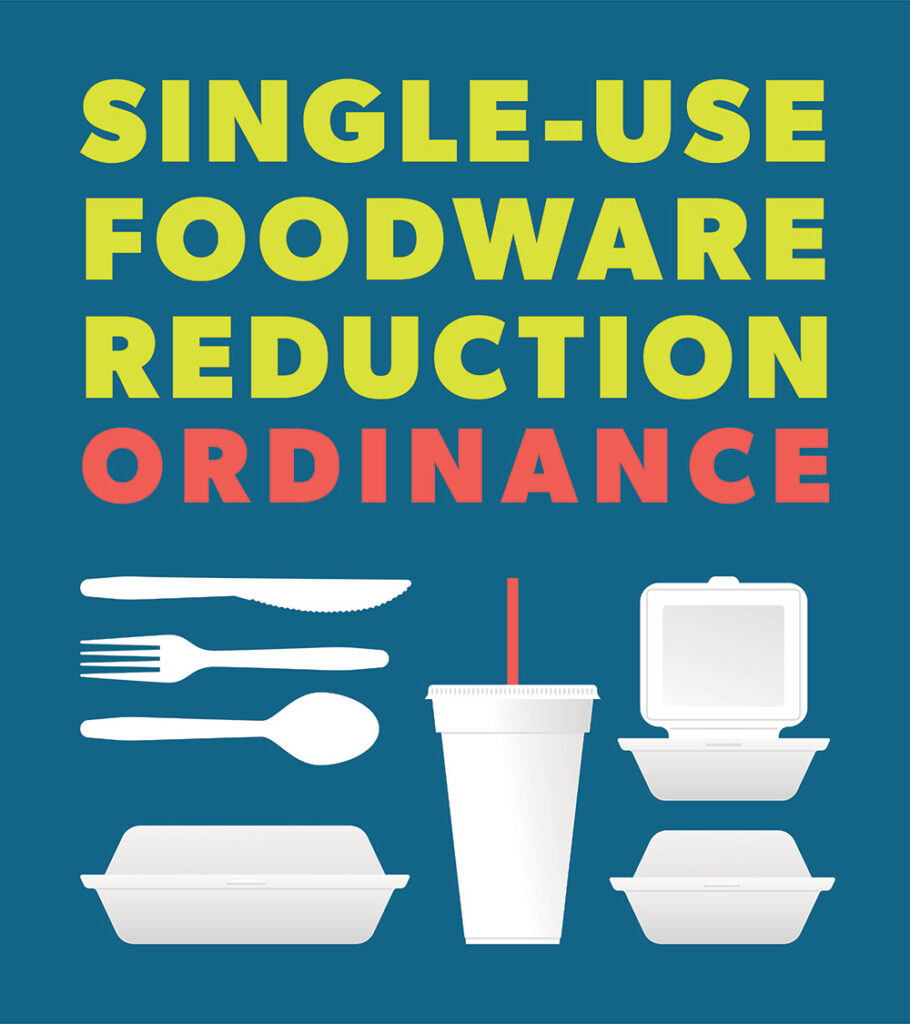

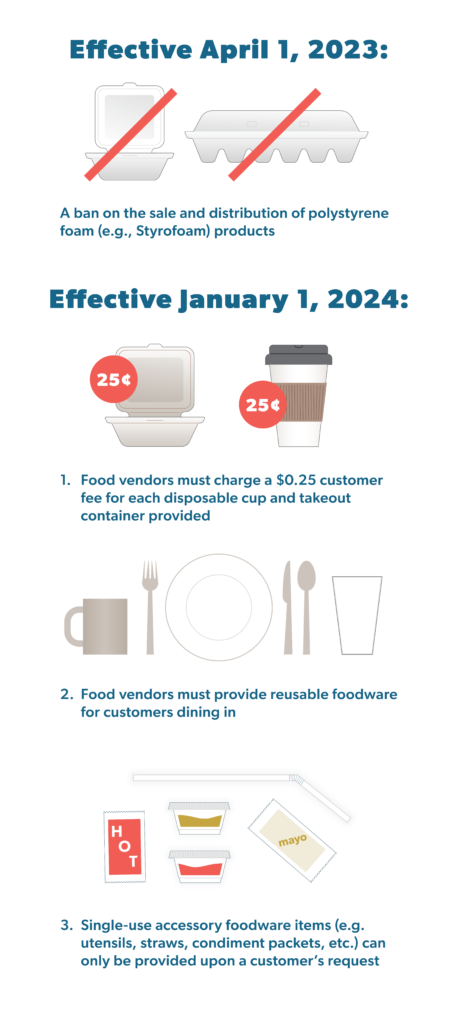
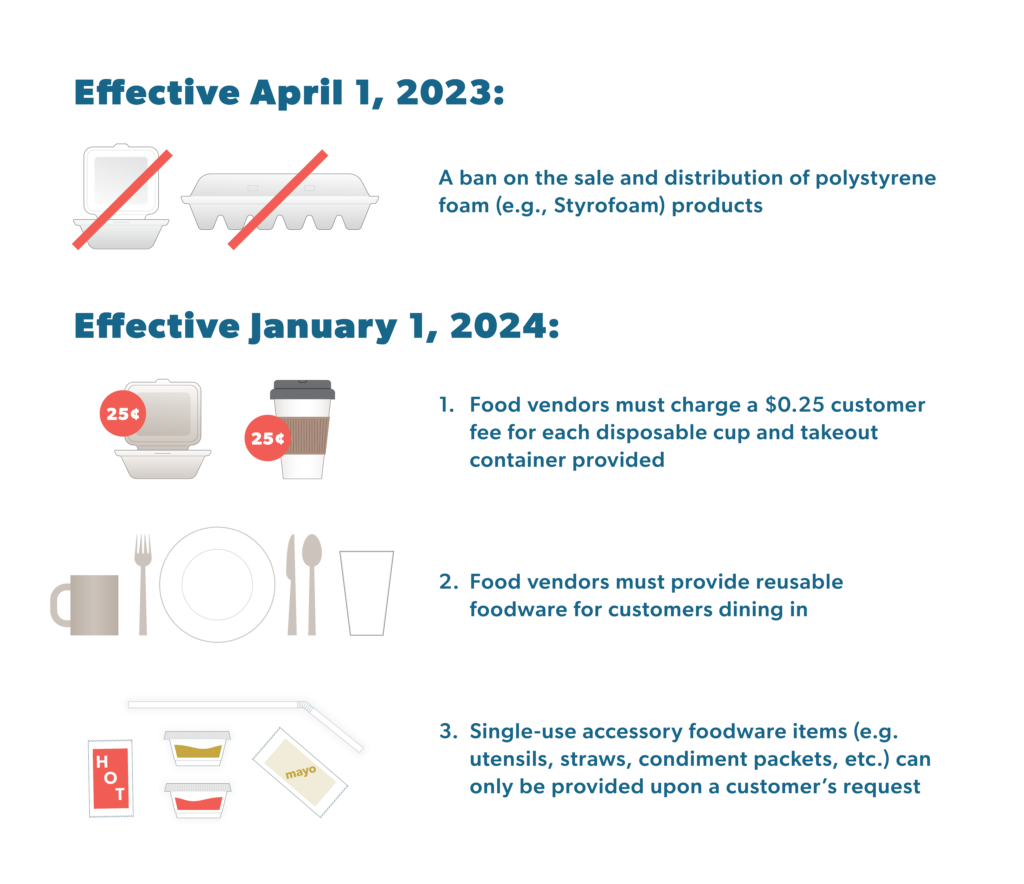
Single-Use Foodware Ordinance Fact Sheet- English
Single-Use Foodware Ordinance Fact Sheet- Spanish
Enforcement: See a business out of compliance with these requirements? Send a message to Recycle@TownOfTruckee.gov.
For an overview of ordinance FAQs see the Keep Truckee Green Foodware Ordinance FAQs.
Para obtener un resumen de las preguntas frecuentes sobre las ordenanzas, consulte las Preguntas frecuentes sobre las ordenanzas de alimentos de Mantengamos Truckee Verde.
Ordinance Background
Community & Business Workshops: A business workshop was held in August 2019 to receive feedback on ideas to reduce the impact of waste. Over 14 food-service business representatives were in attendance. A community workshop was later held in October 2019 where over 65 community members were in attendance and shared community goals surrounding waste reduction.
Single-use Foodware Reduction Working Group: The working group was the steering committee that evaluated the policies in detail and developed recommendations to Town Council. This group included three business owners, two members of the public, two students, one environmental advocate, and two Truckee Town Council Members. The group’s goals included developing equitable and effective policies to reduce excess single-use foodware waste in our community.
Community Survey: Following the working group’s conclusion, staff conducted community outreach to receive feedback on the group’s recommendations. Over 480 survey responses were received providing feedback from community members and businesses. After considering the responses, staff presented the final recommendations and feedback to the Town Council for further consideration.
Cup and Container Fee
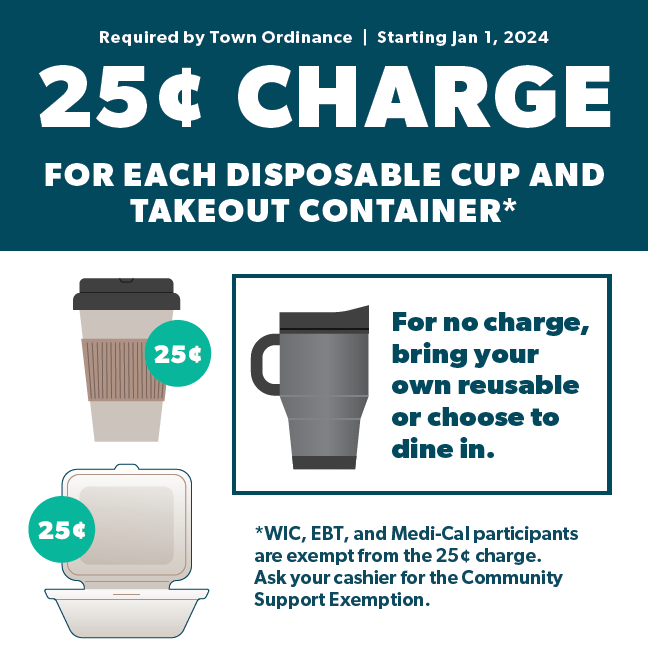
Businesses must charge a $0.25 customer fee on disposable cups and takeout food containers
AVOID FEES AND PREVENT WASTE: bring your own reusable cup or container, OR choose to dine in!
EFFECTIVE: January 1, 2024
WHO IT APPLIES TO: restaurants, food service establishments, coffee shops, bakeries, bars, drugstores, grocery stores
DOES NOT APPLY TO: food trucks or special events
- Businesses keep the fee revenue
- Customers on WIC, EBT, or Medi-Cal are exempt from the fee
- Fee does not apply to pizza boxes or containers provided for leftovers when dining-in
- Customers can provide their own reusable cup or takeout container to avoid the fee.
Food vendors must follow Health and Safety Code requirements to prevent cross-contamination.
Businesses are required to follow California Health and Safety Codes to prevent contamination from customer-provided containers, including keeping customer-provided containers separate from the food facility’s foodware and avoiding contact between customer-provided foodware and surfaces or utensils used for food dispensing. Food establishments have the authority to not accept customer-provided foodware that appears cracked, chipped, is the wrong size, or is unsanitary. In that situation, the customer can take a disposable container and pay the $0.25 fee or choose to dine-in using reusable foodware provided by the restaurant.
In-House Reusable Foodware
Food vendors must provide reusable foodware for customers dining in
EFFECTIVE: January 1, 2024
WHO IT APPLIES TO: restaurants, food service establishments, coffee shops, bakeries, bars
DOES NOT APPLY TO: (1) food trucks or special events; (2) disposable paper food wrappers, aluminum foil food wrappers, paper napkins, straws, paper tray or plate liners, non-plastic stirrers, cocktail sticks, and toothpicks, or pre-packaged food packaged outside the food facility
- New restaurants or other food service establishments seeking a permit from the Town must demonstrate ability to comply with adequate dishwashing capacity
- Exemption Request Form is available HERE: Businesses can apply for a one-year hardship exemption due to hardships reaching compliance
Town grant to purchase reusable foodware and dishwashing equipment closed March 2024.
Foam Ban
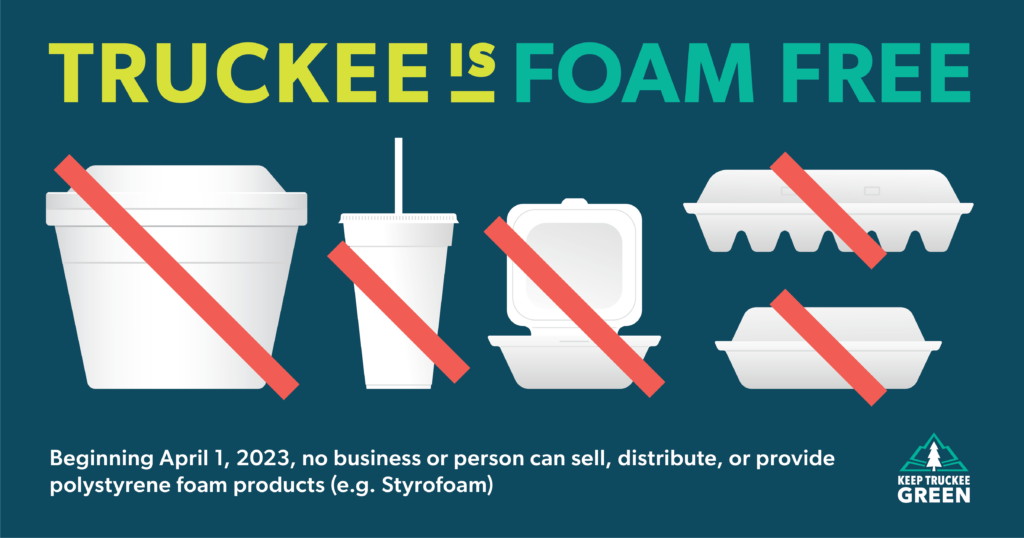
A ban on the sale and distribution of polystyrene foam (e.g. Styrofoam)
EFFECTIVE: April 1, 2023
WHO IT APPLIES TO: all businesses or people, including restaurants, retail stores, and food vendors
DOES NOT APPLY TO: (1) food packaged outside of Truckee, except for egg cartons, and trays for meat, fish, fruit, or vegetables; (2) polystyrene foam products encased in a more durable material (e.g. polystyrene foam ice chests encased in a rigid plastic)
Town grant funding to transition to non-polystyrene foam alternatives closed in June 2023.
Hardship Waivers
Each application for a hardship exemption shall provide evidence of the conditions which make it impossible for the food vendor to comply with the requirement, such as insurmountable space constraints, undue financial hardship and/or other extraordinary, insurmountable circumstances.
Waivers are valid for no more than one year from date of issue. Food facilities must reapply to extend the waiver an additional year.
Business Resources
Single-use Foodware Ordinance Fact Sheet-Bilingual
How to Implement the $0.25 Disposable Cup & Container Fee
Accepting Reusable Containers Guidance for Industry Final 2021
Educational Handout Single-Use Utensils and Condiments By Request- Nevada County – Truckee
Business Point of Sale Discussion Guide
Food Vendor Commonly Asked Questions- January 2024
Additional Information
Working Group Meeting Details
1st Meeting – January 4th, 2022- Meeting Agenda and Documents
2nd Meeting – January 31st, 2022- Meeting Agenda and Documents
3rd Meeting – March 7th, 2022- Meeting Agenda and Documents
4th Meeting – April 4th, 2022- Meeting Agenda and Documents
5th Meeting – May 2nd, 2022- Meeting Agenda and Documents
6th Meeting – June 6th, 2022- Meeting Agenda and Documents
Town Council Meeting Details
August 9, 2022 Town Council Staff Report- Working Group Recommendations
October 25, 2022 Town Council Staff Report- Single-Use Foodware Reduction Ordinance First Reading
November 9, 2022 Town Council Staff Report- Single-Use Foodware Reduction Ordinance Second Reading
Green Box Program

Choose refills, not landfills! Make your to-go meal zero waste. When you order a to-go meal at participating restaurants, request it in a REUSABLE GREEN BOX!
Food vendors in Truckee are now required to charge a 25¢ fee for each disposable cup and takeout container provided with to-go orders. Avoid fees and eliminate waste: use a reusable green box!
How does it work?
- Buy your first green to-go container for $5.
- Rinse the box after you finish eating.
- When you order takeout at a participating restaurant, tell them you want your food in a green box.
- Bring the box back to trade for a clean one with your next order at any participating restaurant, for free!
Available at:

Short-term rental property owners: interested in providing green boxes at your rental for your guests to use while in Truckee? Purchase green boxes from any participating restaurant listed above! Print an info sheet for your guests!
Are you a business interested in using green boxes in your restaurant? Please contact Recycle@TownOfTruckee.gov.
OKAPI Reusables

The Town of Truckee is excited to announce a partnership with OKAPI Reusables to launch a new reusable coffee cup program aimed at reducing single-use waste and supporting local businesses in their shift toward sustainable practices.
How does it work?
The OKAPI Reusables model offers insulated stainless steel and glass cups that customers can borrow and return. With an app-based system: customers join by paying a one-time $10 fee, then check out a cup by scanning a QR code when ordering. Are you a Truckee resident? Ask a staff member at any Town of Truckee participating location for a code to join at a discounted rate! You then have two weeks to return the cup to any participating café. The app tracks borrowed cups and sends reminders, making it easy to stay on top of returns.
Interested in joining? Download the app today:
Available at:
Business Information
Interested in offering reusable coffee cups at your café? Join the OKAPI Reusables program to reduce single-use waste and gain access to the OKAPI Partner Café Dishwashing Grant. Participating businesses with a signed contract are eligible for up to $1,500 in funding, including up to $1,000 for dishwashing equipment and $500 for reusable items, dispensers, or dishwashing supplies. To learn more and get started, email Sierra@Okapi-Reusables.com.
Borrow Greenware

Whether you’re hosting a small picnic or catering a large gathering, you can reduce the impact of your event by using reusable foodware. Create a special ambiance for your event by renting Keep Truckee Green’s free reusable “greenware,” which can provide up to 150 plates, cups, bowls, and utensils.

Greenware is available by reservation only in sets of 25 plates, cups, bowls, and utensils. Borrowers will also receive at least one collection bin for dirty dishes and signage to help guests understand where to return the used dishes. All items including the collection bin must be washed and dried before returning to Town Hall (10183 Truckee Airport Road).
Reservation requests must be submitted at least two business days in advance of your pickup date to allow for Town staff to process your reservation and prepare your greenware. While we can accommodate pick-up and drop-off on weekends and holidays (the pickup location is open 24 hours), reservations requests can only be processed Monday through Thursday during regular business hours.
Requests for pickup on weekends or Mondays must be submitted no later than the previous Thursday (during business hours), or we cannot guarantee the reservation can be processed. We encourage you to submit your reservation request as far in advance as possible, since our greenware sets are often fully reserved during busy times of the year such as the winter holiday season.
Interested in borrowing?
Fill out the Greenware Reservation Form to request a reservation for greenware. Email Greenware@TownOfTruckee.gov with any questions. Thanks for using greenware and helping us reduce waste in our community!
For full details, read the Greenware Guidelines below.
Food Vendor Resources
OKAPI Partner Cafe Dishwashing Grant
Coffee shops in Truckee with a signed contract with OKAPI Reusables are eligible for up to $1,500 in funding for:
- Up to $1,000 reimbursement for procurement or installation of new or upgraded equipment to wash and sanitize reusable foodware
- Up to $500 reimbursement for dishwashing chemicals.
Applications due March 30, 2027.
GRANT DOCUMENTS:
Grant Application Instructions
Grant Application – OKAPI Partner Cafe Dishwashing Grant — applications due March 30, 2027
W-9 Form
Reimbursement Request Form
Restaurant Procurement Guide
As a follow-up to feedback received during business outreach, we have compiled a procurement guide to help food-related businesses procure takeout items that have a lower environmental impact. There are many factors that decide if a product is more or less environmentally friendly, including, but not limited to the material, weight, and packaging. There is no “best” disposable product, but this guide will help businesses with considerations to make when purchasing disposable products. When possible, reusables are always the better option.
Restaurant Procurement Guide Download Guide
Business Resources
Manual Warewashing Instructions
Contact
For questions, technical assistance, or more information, please contact Town staff at Recycle@TownOfTruckee.gov

